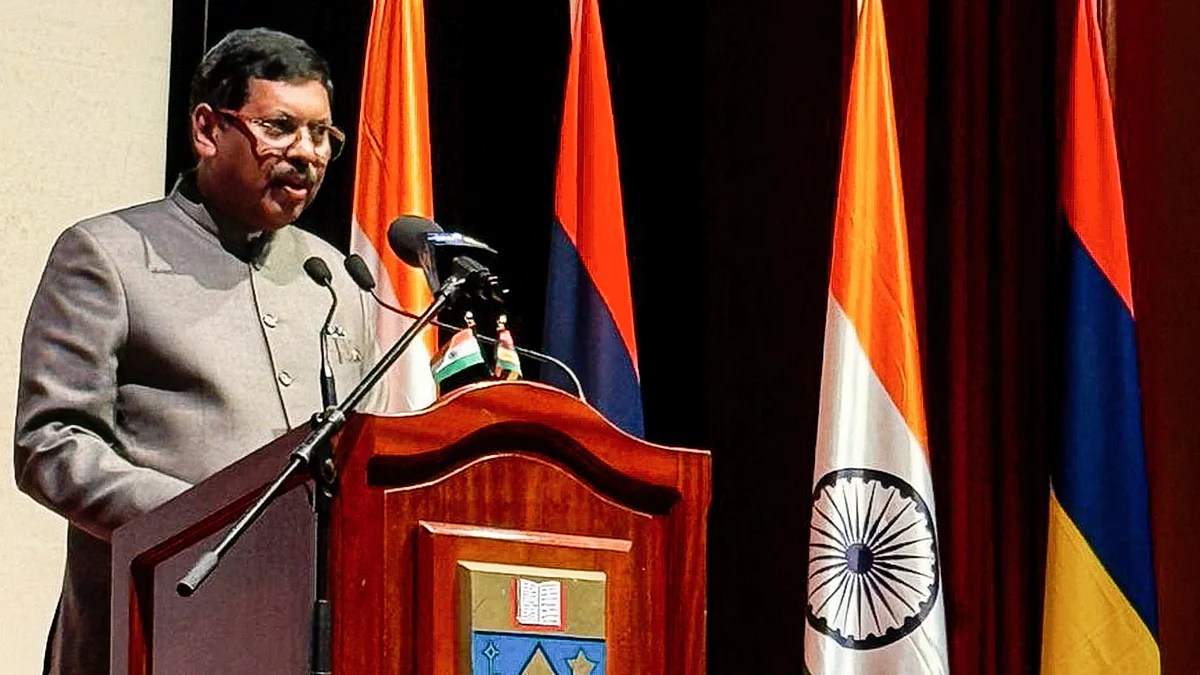Indian legal system governed by rule of law, not by rule of bulldozer: CJI Gavai
At Mauritius lecture, CJI highlights how SC has expansively interpreted rule of law across decades of constitutional adjudication

Chief Justice of India B.R. Gavai on Friday underlined that the Indian legal system is founded upon the rule of law and not the “rule of the bulldozer”. Speaking in Mauritius at the inaugural Sir Maurice Rault Memorial Lecture 2025, he emphasised the judiciary’s role in safeguarding constitutional values and individual rights against arbitrary state action.
Delivering a lecture on ‘Rule of Law in the Largest Democracy’, Justice Gavai recalled his own verdict that deprecated what has come to be known as “bulldozer justice”. The expression refers to the demolition of homes of accused persons as a form of instant retribution.
“The judgment sent a clear message that the Indian legal system is governed by the rule of law, not by the rule of the bulldozer,” the CJI said. He noted that the Supreme Court held such actions bypass due process, violate the right to shelter guaranteed under Article 21, and amount to the executive assuming the roles of “judge, jury, and executioner simultaneously”.
The lecture was attended by Mauritius President Dharambeer Gokhool, Prime Minister Navinchandra Ramgoolam, Chief Justice Rehana Mungly Gulbul, and other dignitaries. Sir Maurice Rault, in whose memory the lecture was instituted, served as Chief Justice of Mauritius from 1978-82.
Justice Gavai used the occasion to highlight how the Supreme Court has expansively interpreted the rule of law across decades of constitutional adjudication. He cited the landmark Kesavananda Bharati (1973) case that enshrined the “basic structure doctrine”, curbing Parliament’s power to amend the Constitution without limit.
“Over the past 75 years since the adoption of the Indian Constitution, the concept of the rule of law has evolved far beyond legal texts, permeating social, political, and constitutional discourse alike,” he said.
In the social sphere, he explained, laws have been enacted to address historical wrongs, and marginalised communities have invoked the rule of law to assert rights against entrenched inequalities. Politically, he said, it stands as a benchmark of good governance, ensuring that institutions and officials remain accountable.
Also Read: Life and death in a ‘bulldozer republic’
Referring to Mahatma Gandhi and B.R. Ambedkar, he observed that their vision showed that in India “the rule of law is not a mere set of rules. It is an ethical and moral framework designed to uphold equality, protect human dignity, and guide governance in a diverse and complex society”.
The CJI referred to significant Supreme Court rulings that have advanced constitutional principles: the abolition of instant triple talaq, the striking down of the adultery law, the scrutiny of the electoral bonds scheme, and the recognition of the right to privacy as fundamental.
“Taken together, these four judgments demonstrate how the Supreme Court has developed the rule of law as a substantive principle, using it to strike down laws that are manifestly arbitrary or unjust,” he noted.
According to Justice Gavai, the articulation of privacy as a fundamental right underscores how the rule of law works both procedurally and substantively—by restraining arbitrary state action, guaranteeing equality before law, and embedding democratic accountability across all branches of governance.
Justice Gavai’s remarks also resonate with recent debates in India, where state governments — particularly in Uttar Pradesh and Madhya Pradesh — have been criticised for using bulldozers to demolish the homes and shops of individuals accused of crimes or of participating in protests.
Supporters have hailed such actions as a tough stance on law and order, while critics, including human rights groups, have condemned them as extra-legal punishments that bypass judicial process and disproportionately target minorities. The Supreme Court’s censure of these practices has therefore assumed wider significance, signalling that executive overreach cannot replace constitutional safeguards.
“The rule of law is thus not a rigid doctrine but a conversation across generations, between judges and citizens, parliaments and peoples, nations and their histories. It is about how we govern ourselves in dignity, and how we resolve the inevitable conflicts of liberty and authority in a democratic society,” Justice Gavai concluded.
With PTI inputs
Follow us on: Facebook, Twitter, Google News, Instagram
Join our official telegram channel (@nationalherald) and stay updated with the latest headlines
Published: 03 Oct 2025, 9:21 PM
